Underrepresented Minority Undergraduate Students Gain Research, Clinical Experience Via the Carle Illinois College of Medicine’s New REACH RCEU
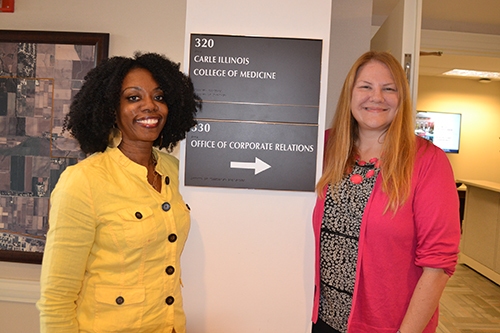
Ruby Mendenhall (left), the Carle Illinois College of Medicine’s Assistant Dean for Diversity and Democratization of Health Innovation, and Lisa Goodpaster (right), Associate Director of Project Management in the Carle Illinois College of Medicine, the two co-coordinators of the Carle Illinois College of Medicine's new RCEU, REACH.
July 19, 2018
There’s a new RCEU in town, REACH (Research and Education for the Advancement of Compassionate Health Care), sponsored and funded by the new Carle Illinois College of Medicine. What’s an RCEU? It’s an REU (a Research Experience for Undergraduates) with a clinical component in addition to the research. Plus, the summer of 2018 REACH participants not only gained research and clinical exposure, but a better understanding of the breadth and interdisciplinary nature of the health care system, and research that impacts it.
Five students, all from out of state, participated in REACH’s maiden voyage. Two were from the University of Puerto Rico (although one is transferring to Central Florida this fall), with one each from Howard University in Washington, DC; Michigan State; and Penn State.
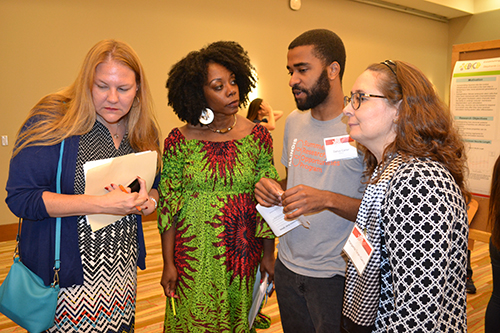
Darius Carter (second from the right) explains his research to (from left to right) Lisa Goodpaster, Ruby Mendenhall, and Margarita Teran-Garcia during the poster session at the Illinois Summer Research Symposium..
Participants were mostly rising sophomores and juniors; freshmen were considered to be too young, and seniors were probably already applying to medical school. Also, the idea was that younger students would have the time to take additional math or other courses they might need that are specific to Carle Illinois College of Medicine.
Because one of the emphases of REACH is to increase the number of underrepresented students in medicine, all five of the first cohort were minority students. “Our focus is students that are looking into healthcare or medical school. So we want to help be part of raising awareness and diversity in that population," explains Ruby Mendenhall, the Carle Illinois College of Medicine’s Assistant Dean for Diversity and Democratization of Health Innovation.
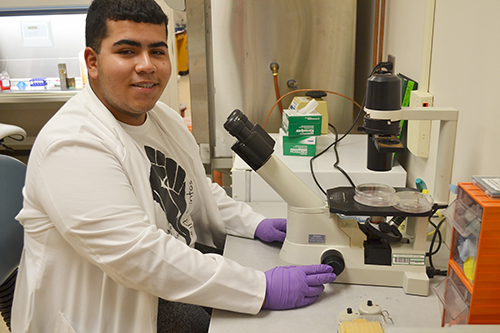
REACH participant, Alexis Chamorro-Ortiz, working in the Spinella Lab.
In addition to steering the students toward careers in medicine, another emphasis was to recruit the students to Illinois’ College of Medicine. For example, REACH held a workshop about how to become more competitive with medical school applications. Plus, the RCEU coordinators were hopeful that participants would become ambassadors for REACH and the College of Medicine, letting folks in their networks know about both the RCEU program and the new college here at Illinois, which has a unique engineering focus.
For the research side of the experience, the undergrads worked in the labs of five campus faculty: Rashid Bashir, Jessica Brinkworth, Karen Tabb, Paul Hergenrother, and Michael Spinella.
For the clinical side, participants shadowed Dr. Teal, a neurosurgeon at Carle’s Spine Institute, on both his hospital and his clinic rounds. Teal also gave them the opportunity to observe a surgery, which many of the participants took advantage of.
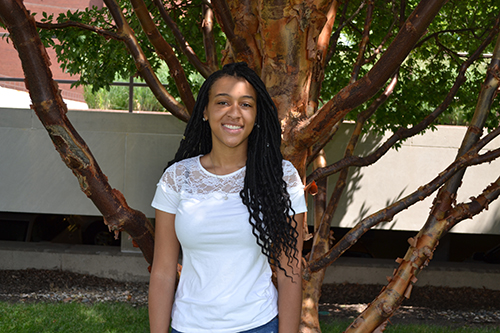
REACH participant, Bri Griffin.
REACH participant Bri Griffin, a rising junior majoring in human biology at Michigan State, indicates that it was because of the clinical exposure that she wanted to participate in the REACH program.
"I love the clinical part;" she admits. "It's my favorite part. I love everything. I'm glad I made my decision to come here."
Regarding the opportunity to shadow Dr. Kevin Teal, she reports, "It's been amazing; I actually got to go watch him perform surgery last week, and it was super, super cool...I got to stand right there while he performed the surgery. He was removing bones from the spine to relieve pressure on the back."
Did seeing the blood get to her? "No, not at all," Griffin asserts.
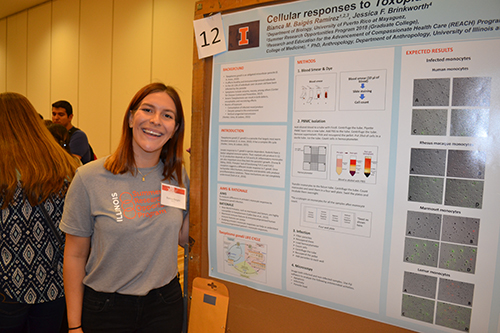
REACH participant, Bianca Baiges with her poster.
The RCEU participants also had the opportunity to volunteer at Avicenna, a local non-profit, community health clinic that’s open only on Sundays. The experience not only exposed students to the regional healthcare system, but allowed them to see more disadvantaged patients, such as migrant workers, compared to Carle patients, who most likely have health insurance. Plus, it gave them a chance to work with other local medical practitioners and/or healthcare students.
REACH is also exposing the participants to workshops taught by affiliate professors who are introducing students to other areas that tie into healthcare. “So it's not just about research; it's not just about clinicals,” reports Lisa Goodpaster, Associate Director of Project Management in the Carle Illinois College of Medicine. “It's about the holistic look of healthcare and everything that ties into it.”
According to Mendenhall, one of the pillars of the College of Medicine is the humanities. So faculty whose research didn't match with any of the students’ hoped-for research areas were involved as REACH affiliates, presenting their research and how it relates to medicine during workshops. For example, Diana Grisby presented about obesity and nutrition's link to health.
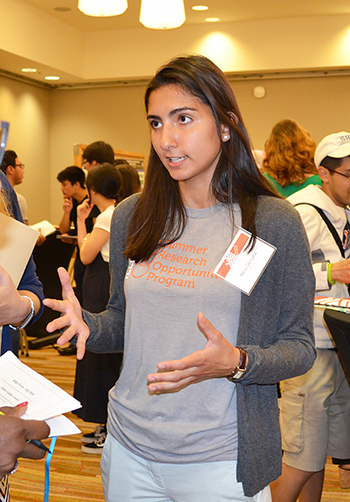
REACH participant, Nina DeLuna presenting at the Illinois Summer Research Institute.
“So we do try to give them this broad exposure to health fields in general and research in that area,” Mendenhall reports. “And as they work in their research labs, we're encouraging them to think about how to incorporate the humanities and the social sciences into the science that they do."
In fact, the program is providing an award for the student who does the best job of incorporating the humanities and social sciences into his or her end-of-the-summer presentation. “We really want them to think how interdisciplinary medicine can be and how complex it is,” says Mendenhall.
Given the focused nature of the program, choosing this summer’s five participants was a rather detailed process. Since REACH is partnering with the campus’ Summer Research Opportunities Program (SROP), this year it tapped into SROP’s applications for REUs across campus. The PIs narrowed down the applications to those interested in medicine. Other criteria were underrepresented minority students who were rising sophomores or juniors. Then, aiming for a mix of students, they looked at students from different majors and who have good grades (but not necessarily a 4.0 GPA). They also looked at personal statements and research statements, although having had research experience was not a requirement either. Goodpaster, says, “We felt like that was a good mix to have to help those that haven't had the opportunity, and to build on the experiences of those that did have a little bit of experience.” A diversity committee subcommittee then narrowed it down to about 22, then five.
Mendenhall shares what she finds rewarding about the REACH program: “I think the thing that I love the most is giving kids—underrepresented students who may not have exposure to the field of medicine—exposure to engineering-based medicine, even exposure to some of the other social scientists and humanists.”
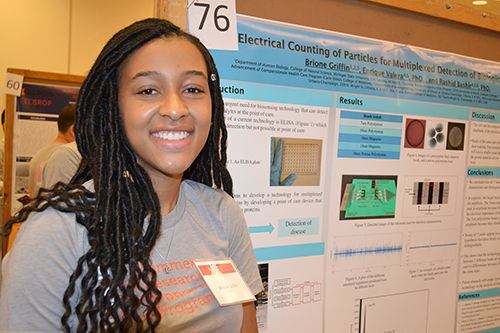
REACH participant, Bri Griffin presenting her poster at the Illinois Summer Research Institute.
Goodpaster has appreciated connecting the students with resources in areas that pique their interest. “They'll be in a workshop or come back from a clinical or research and have a new spark of something. A lot of them have reached out saying, 'Hey, can you connect me with this person?' and I've been able to do that, really giving them the opportunities to just explore healthcare, explore medicine.” Her goal is to help them determine what their interests are, then ask, “‘What can we do to help get you to where you want to be?’ And that's been really rewarding, and they're all so excited about it, which is fun to watch.”
Mendenhall’s long-term vision is to “open up the field of medicine to have different voices, different perspectives, different discoveries, and all of that.”
Building on Mendenhall’s vision, Goodpaster’s goal is to make sure that REACH achieves her goal of diversifying the field of medicine by providing opportunities for minorities underrepresented in medicine, to make sure they have equal opportunity and access to the different things that students need to or want to have in order to go into medicine.
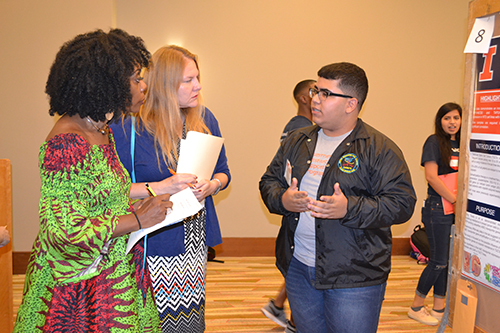
Ruby Mendenhall (left) and Lisa Goodpaster (middle) listen as Alexis Chamorro-Ortiz explains his research.
“We hope that's medical school,” she admits, “and we hope that's Carle Illinois Medical School.”
But even if it's another medical school or healthcare field, she stresses that the program’s goal is to make sure they have the resources and opportunities to get them there. “Because we need them in the healthcare field,” she reiterates.
Mendenhall adds: “So many students of color, underrepresented students have these barriers that they experience, and just to have one or two key people who can kind of give them resources despite those barriers so they can transcend.” She adds that often students of color don’t have the same opportunities. “Their parents aren't physicians and haven't even gone to college in many cases,” she explains, “so I think it's amazing that we can be those one or two people that can help them despite barriers.”
Story and photos by Elizabeth Innes, Communications Specialist, I-STEM Education Initiative.
For additional stories about the REACH RCEU, see:
For more related stories, see: Carle Illinois, REU, Summer Research Programs, Underserved Students / Minorities, 2018













.jpg)
















